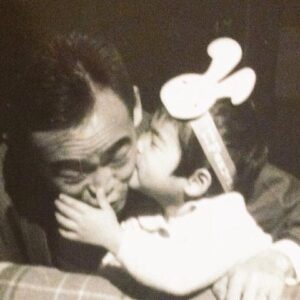‘One day in 2015 I found a collection of photographs in a flea market in country Victoria. Should they be returned to someone in Japan? Or Geelong?’
Sound art by Masako Fukui; Voices Mayu Kanamori and 4You / Kwansei Gakuin University @Tsuda Lab * 福井真佐子作、サウンドアート;声 金森マユと4You関西学院大学津田ゼミ
When Mayu told me about Untitled.Showa, my immediate reaction was perhaps predictable – what a great project that inspires imagination, involves cross cultural sleuthing, bilingual collaborative storytelling.
My next reaction was – I hope this project fails…
Nothing sinister behind this hope, just that age old problem of photography and its burden of truth.
Today, we regularly question the evidentiary power of the photo, and understand that the image’s relationship to the pictured subject is, well, complicated, and no guarantee of authenticity. If a photo is a record of anything, it’s a representation of time, that split second when the shutter closes on the subject.
But we know from the theory of general relativity that time is malleable and can be stretched, warped, even sliced.
Perhaps it’s all relative, and there is no absolute truth embedded in photographs.
Maybe photos only become meaningful in relation to the history/stories that surround them, that hold them.
These photographs in Untitled.Showa were lost/discarded by the owner. And for the finders to reimagine a new history to hold these images seems like a worthy cause.
I appreciate the desire to return them to the original owner. But I don’t want the owner’s story to trump this new history now in creation. And we know that it will, because we still hang onto the belief that photographs might possess some kind of existential truth, an essence. These photos may hold clues, but untethered from their stories, they are empty of meaning.
‘One day in 2015 I found a collection of photographs in a flea market in country Victoria. Should they be returned to someone in Japan? Or Geelong?’
Yes, sure. They should be returned to someone. But I hope they’re not.
****
「2015年のある日、ビクトリア州の田舎の蚤の市で古い写真を見つけました。日本の誰かに返すべきでだろうか?それともジーロングの誰かに?」
マユから『Untitled.Showa』の話を聞いたとき、私の反応はごく普通のものと思える。想像力を刺激する素晴らしいプロジェクトで、異文化間での捜査や、二ヶ国語での共同のストーリーテリングが行われる。
次の瞬間思ったことは、「このプロジェクトが失敗すればいいのに」ということ…。
裏には何の悪意もありません。ただ、写真には昔から真実の重荷という問題を抱えている。
最近の私たちは定期的に写真の証拠力に疑問を持ち、画像と被写体の関係は複雑で、真正性を保証するものではないことを理解している。写真が何かの記録であるとすれば、それは時間の表現であり、被写体にシャッターが切られた瞬間の一瞬のこと。
しかし、一般相対性理論によれば、時間は可鍛性であり、引き伸ばしたり、ゆがめたり、さらには切り刻んだりすることができる。
もしかすると全ては相対性に基づき、写真には絶対的な真実はない。
写真は、それを取り巻く歴史や物語との関係において、はじめて意味を持つのかもしれない。
Untitled.Showaの写真は、持ち主によって失われたり、捨てられたりしたものです。そして、その発見者がこれらの写真を保持するために、新たな歴史を再構築することは、価値ある目的のように思う。
元の持ち主に返したいという気持ちはわかる。しかし、元の所有者のストーリーが、今作られている新しい歴史に勝ることを望まない。なぜなら、私たちは未だに『写真には何か存在する真実や本質がある』という信念を持ち続けているから。これらの写真には手がかりがあるかもしれないが、ストーリーから切り離された写真には意味がない。
「2015年のある日、ビクトリア州の田舎の蚤の市で古い写真を見つけました。日本の誰かに返すべきでだろうか?それともジーロングの誰かに?」
はい、もちろん。誰かに返されるべき。でも、そうならないことを願ったりしている。
ーby Masako Fukui September, 2021
ー2021年9月、福井真佐子
I was born in India to Japanese parents. I spent some of my formative years in Japan, but mostly grew up in Sydney, where I now reside. https://masakofukui.com/
日本人の両親のもと、インドで生まれました。幼少期は日本で過ごしましたが、ほとんどはシドニーで育ち、現在はシドニーに住んでいます。 https://masakofukui.com/

Recent Comments